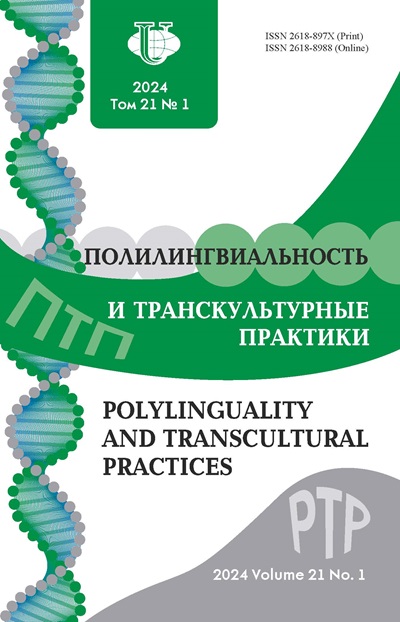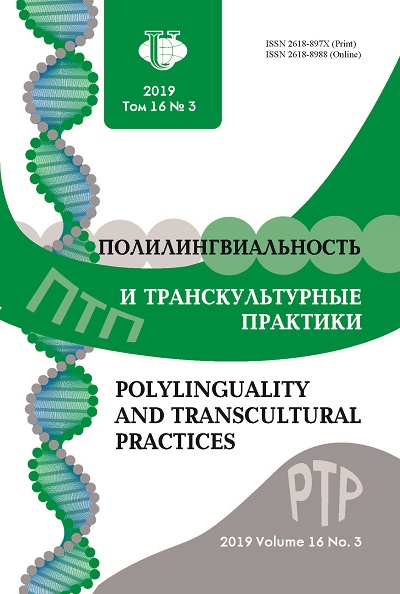Linguistic and Stylistic Features of Translingual Writers: Comparative analysis
- Authors: Lebedeva E.S.1, Lupacheva T.A.2
-
Affiliations:
- Moscow State University of Lomonosov
- Far Eastern Federal University
- Issue: Vol 16, No 3 (2019)
- Pages: 347-357
- Section: LITERARY SPACE
- URL: https://journals.rudn.ru/polylinguality/article/view/21824
- DOI: https://doi.org/10.22363/2618-897X-2019-16-3-347-357
Cite item
Full Text
Abstract
The present research is conducted within the frameworks of language contacts theory, intercultural communication theory, text linguistics and linguacontactology. Creative translingualism is the object of the research. Linguacreative characteristics of translingual fiction are the subject of the research. Fiction written by Russian and Chinese authors in English (Olga Grushin, Irina Reyn, Lara Vapnyar, Anya Ulinich, Gish Jen, Ha Jin, Amy Tan, Jade Snow Wong, Frank Chin, etc.) has served as the material for the analysis. Within the scope of the present research the similarities and differences of linguacreativity in the fiction written by authors belonging to unrelated linguacultures were determined. The range of native culture description means used by translingual writers is very diverse: loan-words, code switching and code mixing, native literature and songs allusions, contaminated speech, usage of English lexical units to transmit significant for native culture events (by attributing culturally specific meanings).
About the authors
Ekaterina S. Lebedeva
Moscow State University of Lomonosov
Author for correspondence.
Email: chaton17@mail.ru
Senior Lecturer, Faculty of Foreign Languages and Area Studies, Department of Foreign Languages Theory, Moscow State University of Lomonosov
31/1 , Moscow, 119192, Russian FederationTatyana A. Lupacheva
Far Eastern Federal University
Email: lupachyova@yandex.ru
Candidate of Philology, Associate Professor, Associate Professor of the Department of Linguistics and Intercultural Communication, Far Eastern Federal University, Vladivostok, Russia
8 , Vladivostok, 690091, Russian FederationReferences
- Tlostanova, M.V. 2000. Problema mul’tikul’turalizma i literatura SShA XX veka [Multiculturalism and American Literature of the 20th century]. Moscow: Naslediye Publ. Print. (In Russ.)
- Proshina, Z.G. 2017. Translingualism and its Application. RUDN Journal of Language Education and Translingual Practices, 14 (2): 155—170. Print (In Russ.)
- Valuitseva, I.I., and Khukhuni G.T. 2015. Literary Bilingualism: PRO and CONTRA. RUDN Journal of Language Education and Translingual Practices, 5: 298—303. Print. (In Russ.)
- Yuzefovich, N.G. 2011. Inolingvokul’turnyi substrat v translingval’noi literature: postanovka problem [Foreign Linguacultural Subsrate in Translingual Literature]. Speech and Context 2 (III): 235—244. Print. (In Russ.)
- Tumanova, A.B. 2010. Kontaminirovannaya yazykovaya kartina mira v khudozhestvennom diskurse pisatelya-bilingva [Contaminated Linguistic Worldview in a Literary Discourse of a Bilingual Writer]. Almaty: Kazakh british Technical University publ. Print. (In Russ.)
- Bakhtikireeva, U.M. 2015. Russkoyazyichie kak aktualnaya mezhdistsiplinarnaya problema [Russian-speaking as an Actual interdisciplinary Problem]. Sotsialnyie i umanitarnyie nauki na Dalnem Vostoke. 1 (45): 94—99.
- Sorokin, Yu.A. 2003. Perevodovedenie: status perevodchika i psikhogermenevticheskie protsedury [Translation Studies: Translator’s Status and Psychological and Hermeneutical Processes]. Moscow: Gnozis Publ. print (in Russ.)
- Popova, Z.D., and I.A. Sternin. 2007. Yazyk i natsionalnaya kartina mira [Language and National Worldview]. Voronezh: Istoki Publ. Print. (In Russ.)
- Kabakchi, V.V., and Yuzefovich N.G. 2007. Foreign Linguacultural Subsrate in Cross-cultural Communication. ISSUES OF COGNITIVE LINGUISTICS 3: 95—101.
- Butenina, E.M. 2010. Sovremennyi roman SShA [Modern American Prose]. Vladivostok: Maritime State University Publ. Print. (In Russ.)
- Dagnino, A. 2012. “Transcultural Writers and Transcultural Literature in the Age of Global Modernity”. Transnational Literature 4 (2). Web. Publ. https://dspace.flinders.edu.au/xmlui/ bitstream/handle/2328/25881/Transcultural_Writers.pdf;jsessionid=FD0A9FB527D0C787123 C115029DFEEB9?sequence=3 Web.
- Kellman, S. 2000. The Translingual Imagination. Lincoln: University of Nebraska Press.
- Nordin, I.G., J. Hansen, and Llena C.Z. 2013. Transcultural identities in contemporary literature. Amsterdam-New York: NY.
- Wanner, A. 2011. Out of Russia: Fictions of a new translingual diaspora. Evanston, Illinois: Northwestern University Press.
- Ulinich, A. 2008. Petropolis. New York: Penguin.
- Tan, A.1992. The Kitchen God’s Wife. New York: Ivy Books.
- Reyn, I. 2008. What happened to Anna K. New York: Touchstone.
- Jen, G. 2000. Who’s Irish? New York: Vintage Books.
- Grushin, O. 2010. The Line. New York: Penguin.
- Wong, J.S. 2000. Fifth Chinese Daughter. Seattle and London: University of Washington Press.
- Vapnyar, L. 2004. There are Jews in My House. New York: Anchor Books.
- Jin, H. 2001. In the Pond. Great Britain: Vintage.
- Jen, G. 1998. Typical American. London: Granta Books.
- Chin, F. 1981. The Chickencoop Chinaman. The Year of the Dragon. Seattle and London: University of Washington Press.
- Grushin, O. 2007. The Dream Life of Sukhanov. New York: Penguin.















